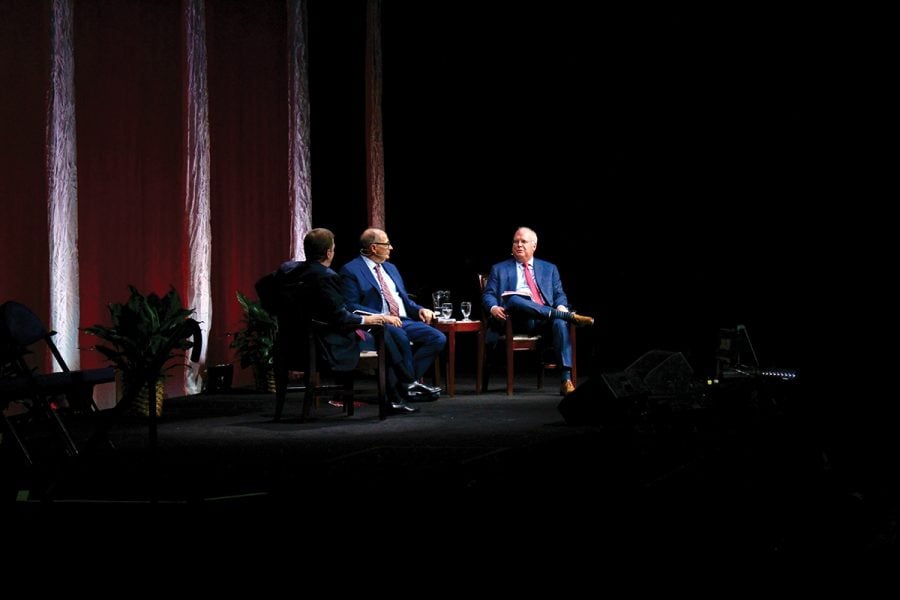Rove, Axelrod kickstart Bryan Series
High-profile political strategists David Axelrod and Karl Rove served as the first Bryan Series speakers of the 2018-2019 program. // Photo by Finn Williamson/The Guilfordian
“We seek to find ways for people who disagree or have very different views to stay in the room together and try and find some commonality” said Jane Fernandes, president of Guilford College. “These are two men have been working on that, and hopefully they will show us how to do it.”
The aforementioned men, Karl Rove and David Axelrod, started this year’s Bryan Series on Monday, Oct. 1 at the Greensboro Coliseum after the original scheduled event was postponed for Hurricane Florence. The two are both high level political analysts from opposite sides of the aisle. Rove served as George W. Bush’s senior advisor and deputy chief of staff, and Axelrod served in a similar role for Barack Obama.
The event was focused around positive political dialogue and the state of politics.
“Tonight’s event has been constructed so you can experience and in some ways participate in a constructive conversation about politics,” said Associate Vice President for Alumni and Constituent Relations Ty Buckner.
Buckner also announced the event would be moderated by the host of the Meet the Press, Chuck Todd.
“They have encouraged us and will encourage us tonight to be the best people we can be,” Fernandes said. “They will encourage us to have our own opinions, and know how to hold them, but avoid sinking to attacks, rash judgments or misdirected anger.”
Todd started the conversation by talking about Supreme Court Justice Nominee, Brett Kavanaugh. Kavanaugh has been accused of sexual assault, and in confirmation hearings has been openly partisan in his attacks against the Democrats. Despite this, both speakers felt it likely the nominee would be confirmed but suggested this would result in a dramatic shift in supreme court politics.
“For the first time, one of the institutions that has always been outside of politics, will be tarnished,” said Rove.
Axelrod described the standing of politics as a scrum, stating that the courts should be outside of that. He hoped for a change in this.
“In a democracy, the responsibility starts with us,” said Axelrod. “We’ve got to demand more.”
The speakers also talked about midterm politics. Todd said that political analysts have suggested that this discourse about Kavanaugh have been good for the Republicans.
“I’ve spoken to several Republican strategists who would love this fight to keep going,” said Todd. “What they’ve seen, for the first time in years, is equal enthusiasm.”
While some said the backlash against President Donald Trump in the midterm elections will be large, Rove felt that the reaction will not be as drastic as some may suggest.
“There has never been a political landscape this favorable to the party in power,” Rove said. “No matter what happens, I think the majority is going to be so small that it’s going to be hard to govern.”
Both nominees were asked who they thought would be the Democratic presidential nominee in 2020. Neither picked a name, but both shared ideas.
“I think what people are going to be looking for is someone who can lift this country up and bring this country back together,” Axelrod said. “I think it would be a mistake to elect someone whose biggest point is, ‘I can be as nasty as Trump.’”
Todd also asked what the speakers wished had been done differently in the years preceding the Trump presidency.
“There is a strong case to be made that the two of you gave us Donald Trump,” Todd said.
Both speakers went on to list some regrets from their time in office.
“We should not have wasted 2005 going after Social Security reform,” Rove said. “We should have focused on immigration reform. We probably could’ve done that.
“If we had taken on immigration we would have been in a better spot and Donald Trump wouldn’t have been able to use that.”
Axelrod was rather pleased with the list of accomplishments from Obama’s second term but felt they may have neglected certain constituents.
“As you go down the list, I live in rural Michigan, and I wonder what on that list was done for my neighbors,” Axelrod said.
Todd also answered for the responsibility of the media in Trump’s candidacy.
“We made a couple of mistakes. The biggest mistake we made was we took this election as a referendum on Donald Trump, when the country took it as a referendum on Hillary Clinton,” Todd said.
The event concluded with discussion about money in politics. Axelrod feels that corporations should not have as much money in politics.
“The fact that our elected officials have to spend more than 60 percent of their time raising funding is bad,” Axelrod said. “I don’t feel like politicians should feel mortgaged to their donors.”
Rove, who works as an informal adviser for a Super-Pac, argues that corporations should have as much say as labor unions, both of which provide money in a similar way. However, both Axelrod and Rove felt transparency about money was important.
“Money in politics is life,” said Todd. “Money finds a way. The only opportunity you have is disclosure.”
Rove and Axelrod stayed after the event to sign books and meet members of the audience. The next speaker in the series will be Kareem Abdul-Jabbar on Oct. 23.









